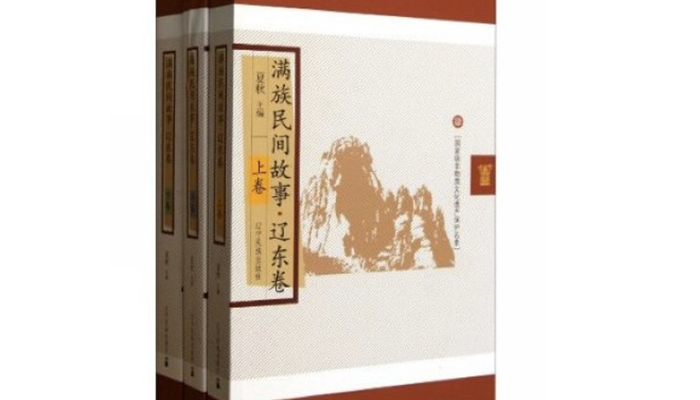Manchu Folk Stories
Manchu Folk Stories
Liaoning is a region where Manchu people have formed, risen and grown up. It contains extensive and profound Manchu cultural relics and connotations. Manchu folktales originated from the Manchu people's transition from "fishing and hunting" to "farming", and were closely contacted and integrated with the Han culture, gradually forming the cultural characteristics of Manchu-Han mixed culture, a specific historical stage. These characteristics are clearly reflected in the stories of collective creation, inheritance from generation to generation, and "record" the world of their lives and meanings by the Manchu people in Liaoning Province.
On June 7, 2008, it was approved by the State Council to be included in the second batch of national intangible cultural heritage list.
Inheritance significance
The "Manchu Folk Stories" project was declared by Liaoning Provincial Association of Folk Literators and Artists, and was successfully selected into the second batch of national intangible cultural heritage list. Following that, the author conducts resource survey, field investigation, data collation, project text and video production of Manchu folk tales in Liaoning Province. At the same time, according to the results of the survey, the author uses the theories of ethnology, folklore, anthropology and sociology to study the historical and cultural value of Manchu folk tales.
Table distribution
Manchu mythological works accounted for 60% of all titles, and legends of Qing Dynasty were less than 5%. The same collection of similar stories published in Acheng area of Heilongjiang Province, the legends of ancestors'entrepreneurship accounted for about 50%, and legends of Qing Dynasty accounted for about 30%. If we divide the "Story Volume of Chengde Area" by percentage, it can be said that the historical figures, scenery and historical legends of the Manchu people in the Qing Dynasty accounted for about 50% of all the chapters, and other stories reflecting Manchu customs and life accounted for about 5%, while the original Manchu myths and ancestor entrepreneurship legends did not. Undoubtedly, the Manchu folktales in Northeast China depict the social life of Manchu ancestors in the pre-Qing period. Chengde reflects the social life of the Manchu people in the Qing Dynasty.
primary coverage
Odori Mafa
There are twenty-seven villages in the lower reaches of the Huerha River. There are three herds of animals in this place, one is the old bear herd, the other is the wild boar herd, the third is the wolf herd, and the voles always inform them, and then, in the chaos to find benefits. Three herds of animals have been attacking and disturbing in turn, and people's lives are very poor. Later, from the upper reaches of the Huerha River came an old man, Odori Mafa. He taught people to practice archery and knife skills. Finally, he defeated three herds of animals. The people regained their happy life, and the old man went to other places. Odori Mafa was later worshipped as the "hunting god".
Stone Manni
It is said that Shimani was the great Sama of Sumuhara in Xianfeng. He is supernatural, eliminating evil and disease, and rescuing difficulties. This is a record of three short stories about him. One is "rescue the calf waiter", which is about a village called "two families" in the North Bank of the middle reaches of Mudanjiang River. A child named "Chong'a" herded cattle to his four grandfathers at the age of twelve. Xiao Chong'a's four elders, nicknamed "Four Points", abused Xiao Chong'a and forced him to work all day, but did not let him eat enough, nor let him sleep well. Chong'a's life was very bitter. Once, the cow was shocked and swam across the river. Chong A cried in a hurry. Da Sama helped him and decided to punish the "four tips". He falsely deposited two buckets of rice in a four-pointed barn. At night, the rice grains became countless mice, stole the grain and delivered it door to door. "Four Points" knew that it was Chong A Bao's letter and abused him even more. Da Sama decided to punish him thoroughly. He had a headache because of the spell. No one could cure him well. Only Chong A could live a good life. However, the "four-pointed" made him bad, deceived him into treating his illness and began to mistreat Chong A. However, Toli was not able to do it well in his hands. Finally, the "four-pointed" died of his headache. The second is "rescuing Pearl pickers". It is about a poor old pearl picker in Hailang estuary who picked up a rare pearl, but was forcibly taken by Zhang Jing of the Ang Bang of Yamen in the name of false pearls. He prepared to go to Beijing to offer his jewels. Da Sama became the military aircraft minister who inspected the Pearl and put it in his place on purpose. Then he applied the law to make it false and force it to hand over the pearls. Thirdly, "rescue the pottery salesman", refers to a pottery craftsman named Niu Gulu, who lives in the middle of the river fork. This year, the rain is continuous and the flood is coming, but Niu Gulu does not know. Big Samar, incarnated as an old man, broke into the house, picked up valuable things and ran away. Niu Gulu was chasing after him, thus avoiding a disaster.


-
1.Wuhan Donghu Scenic Area
Wuhan Donghu Eco-tourism Scenic Area, referred to as Donghu Scenic Area, is located in the central city of Wuhan, Hubei Province. It is a national 5A-level tourist attraction, a demonstration site of
Time 2018-12-12 -
2.Bijiashan Scenic Area
Bijiashan Scenic Area is located in Tianqiao Town, Jinzhou City, Liaoning Province. The main scenic spots are Bijiashan Island and "Tianqiao", which are divided into five areas: island sight
Time 2019-01-02 -
3.Harbin Amusement Park
Harbin amusement park is located at the junction of the outer Road area and Nangang District. It was founded in 1958. Originally known as Harbin Cultural Park, it covers an area of 22.8 hectares.
Time 2019-01-13 -
4.Bo dance
Horqinbo dance, a primitive religious dance, is a form of Mongolian Bo (Shaman) "Xingbo" (Dancing God) and sacrifice. It is characterized by the combination of inspiration,
Time 2019-04-04 -
5.Hui Heavy Knife Wushu
Heavy knife is the original name of big knife. It is a traditional weapon around Beijing and Tianjin. It has a history of thousands of years in China. The original name of Jinmen
Time 2019-05-04 -
6.Yueqing Poplar Wood Carving
Yueqing boxwood carving, a kind of ornamental round carving art with boxwood as its material, is mainly popular in Houhengcun, Wengyuan Street and Lecheng Street of Liushi Town in Yueqing City,
Time 2019-05-11 -
7.Mongolian Wedding
Mongolian young men and women marry on auspicious days, and men give gifts to women's homes. The gifts include cash, clothes, cloth, jewelry, rice and so on. There are cabinets, bedding, clothes, jewe
Time 2019-06-03 -
8.Xinjiang Opera
Xinjiang Opera, commonly known as "Xinjiang Xiaoqu", is a kind of local opera with unique style, which has been gradually formed and perfected after Shaanxi Opera, Qinghai Pingxian Opera, La
Time 2019-07-06 -
9.Fan making Techniques
Suzhou Fan is a special product of Suzhou. It is famous for its elegance, delicacy and artistic characteristics. Including folding fan, sandalwood fan and silk Palace fan, collectively known as "
Time 2019-07-25 -
10.Brown Fan Dance
On the day of the grand Brown fan dance festival, adult men gather in groups on a square with their own delicacies and rice wine every day, and hold a large-scale Brown fan dance activities by arrangi
Time 2019-08-16 -
11.Chengdu Normal University
Chengdu Teachers College is an undergraduate teacher's college in Sichuan Province, which is a pilot University for the overall transformation of Sichuan's comprehensive reform. The school's predecess
Time 2019-08-31 -
12.Administrative division of Panzhihua
Panzhihua City has 5 county-level administrative divisions (Municipal District 3, county 2) and 49 township level administrative divisions (street 11, town 23, township 15). It covers an area of 7440 square kilometers and has a population of 1.12 million. Panzhihua Municipal People's government is located at No. 2, bingcaogang street, East District.
Time 2020-12-14